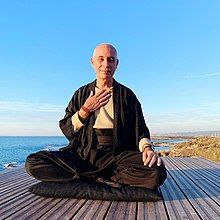Draft:Buddhism in Israel
 | Review waiting, please be patient.
This may take 2 months or more, since drafts are reviewed in no specific order. There are 1,778 pending submissions waiting for review.
Where to get help
How to improve a draft
You can also browse Wikipedia:Featured articles and Wikipedia:Good articles to find examples of Wikipedia's best writing on topics similar to your proposed article. Improving your odds of a speedy review To improve your odds of a faster review, tag your draft with relevant WikiProject tags using the button below. This will let reviewers know a new draft has been submitted in their area of interest. For instance, if you wrote about a female astronomer, you would want to add the Biography, Astronomy, and Women scientists tags. Editor resources
Reviewer tools
|
Buddhism in Israel refers to the Buddhist community living in Israel. Buddhism in Israel constitutes a minority. According to World Population Review as of 2022 census, the population of Buddhists in Israel is around 20,000 constituting 0.30% of the total population.[1]
 | |
| Total population | |
|---|---|
| 20,000 (2022); 0.3% of total population | |
| Regions with significant populations | |
| Tel Aviv, Haifa | |
| Religions | |
| Zen and Tibetan Buddhism | |
| Languages | |
| Hebrew, Chinese, English |

Historical context
[edit]Buddhism was introduced to Israel in the mid-20th century, largely through the interest of David Ben-Gurion, Israel's first Prime Minister. In the 1950s, Ben-Gurion began a correspondence with Nyanaponika Thera, a distinguished German-born Buddhist monk, which lasted for six years and had a lasting impact on Ben-Gurion's understanding of Buddhist philosophy. In 1961, Ben-Gurion visited Burma (now Myanmar), where he spent time at a Buddhist retreat, further deepening his personal engagement with Buddhist practices. This growing interest among key Israeli figures helped lay the foundation for Buddhism's presence in Israel.[2]
Following Ben-Gurion's interest, Buddhism began to gain attention in Israel. The 1960s and 1970s saw a growing interest in Eastern philosophies among Israelis, many of whom traveled to countries like India and Nepal, where they encountered Buddhist teachings. Upon returning, some individuals established meditation groups and centers, contributing to the gradual establishment of Buddhist communities within Israel.
The Dalai Lama has visited Israel three times: in 1994, 1999, and 2006.[3]
An additional factor to Buddhism's introduction in Israel is that Jews and Buddhists have no history of communal conflict. Moreover, Buddhism has never been associated with Anti-semitism.[4]
Demography
[edit]The World Religion Database states that as of 2020, approximately 0.47% of Israel's population identifies as Buddhist.[5]
Another source, NationMaster reported approximately 23,121 Buddhists in Israel in 2013, estimating for about 0.3% of the population at that time.[6] That year, between 20 and 25 Buddhist centers were operating in Tel Aviv.[7]
Judaism and Buddhism
[edit]This article relies largely or entirely on a single source. (January 2025) |
Practicing Buddhism in Judaism is seen as a violation of the prohibition against idol worship (avodah zarah), and those who convert to Buddhism are considered apostates. One key reason of the acceptance of Buddhism is it's non-theistic nature. Buddhism does not involve a belief in God in the way that Judaism does, making it more accessible for Jewish agnostics and atheists. This allows them to embrace Buddhist practices without needing to make a significant change to their theological perspective.
It is pointed out by some observers that Judaism and Buddhism share a similar understanding of suffering.[8] Throughout Jewish history, suffering has been a recurring theme, especially highlighted by the Holocaust which has shaped a theology of suffering that permeates contemporary Jewish culture, even among those who may feel disconnected from the faith. In Buddhism, the concept of suffering is central to its teachings on spiritual salvation, emphasizing both its causes and solutions. The Jerusalem Report quoted about an Israeli living in Dharamsala, a town in northern India where the Dalai Lama lives. The Israeli said, "It's very Jewish, you know, to always talk about suffering, just like Buddhists do."[4]
Buddhist Centers in Israel
[edit]The Diamond Way Buddhism Centers are among the most prominent Buddhist establishments in Israel, with seven locations spread across the country.[9][10][11]
See also
[edit]References
[edit]- ^ "Buddhist Countries 2024". worldpopulationreview.com. Retrieved 2025-01-03.
- ^ "The Dharma of David Ben-Gurion". Tablet Magazine. 2020-10-16. Retrieved 2025-01-03.
- ^ Freedman, Eliyahu (2024-06-09). "Dalai Lama and the Jews: 5 Interesting Connections". Aish.com. Retrieved 2025-01-03.
- ^ a b "The Jewish-Buddhist Encounter". My Jewish Learning. Retrieved 2025-01-03.
- ^ "National Profiles | World Religion". The Association of Religion Data Archives (the ARDA). Retrieved 2025-01-03.
- ^ "Israel Religion Facts & Stats". www.nationmaster.com. Retrieved 2025-01-03.
- ^ "A different path". The Jerusalem Post. 2013-04-25. Retrieved 2025-01-03.
- ^ "A different path". The Jerusalem Post. 2013-04-25. Retrieved 2025-01-03.
- ^ ג, ו. "Homepage". Diamond Way Buddhism. Retrieved 2025-01-04.
- ^ "Israel". www.buddhism-foundation.org. Archived from the original on 2024-05-23. Retrieved 2025-01-04.
- ^ "Study of Buddhism in Israel - Study Israel". carleton.ca. Retrieved 2025-01-04.
